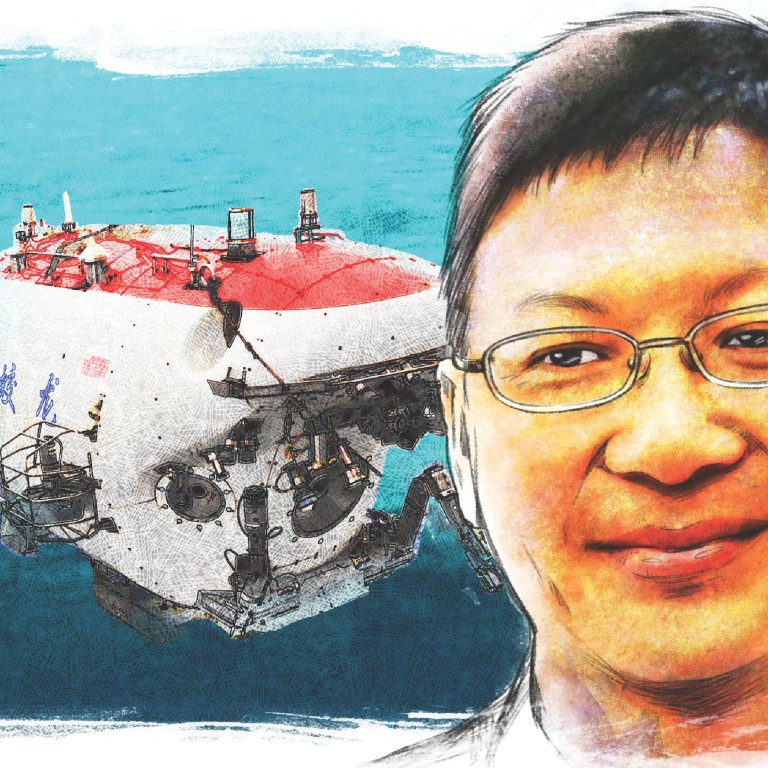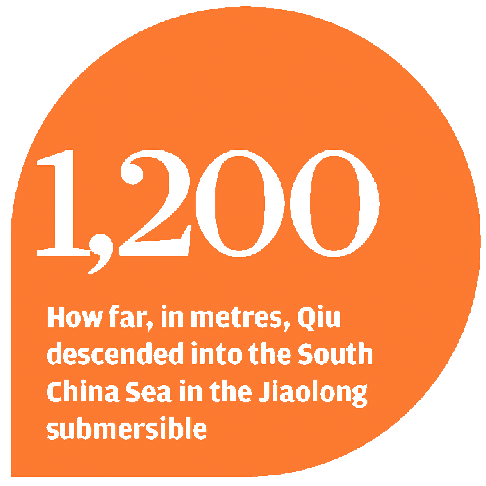
Deep-sea researcher lives the life aquatic
Marine biologist Dr Qiu Jianwen finds a delicate balance between understanding and preserving the country's fragile marine ecosystems
From sea urchins near Tolo Harbour to strange creatures in the South China Sea, Dr Qiu Jianwen walks a fine line between researcher and conservationist in his work as a marine biologist.

The 40-day expedition saw him dive more than a kilometre down into the South China Sea to collect samples of rare marine life only found in the cold seep, an area of the ocean floor where hydrogen sulfide, methane and other hydrocarbon-rich fluids seep into the sea.
The trip saw him struggle to find a balance between his work as a researcher and his responsibility to protect the fragile marine environment.
"When we go down to the cold seep to get the glass sponge, which can live for over 10,000 years … we need to decide whether to collect them and how many to collect," Qiu said.
"After doing scientific research, I respect life more, and sometimes I struggle with whether to take [creatures] or not."
During the trip, the team collected only one glass sponge, an uncommon form of sponge with a skeleton that is found only in a cold seep, and two similar organisms of a different species on a sea mountain.
He also collected about 20 mussels, 10 galatheid crabs and a number of samples of as yet unknown species, which he will spend the coming months studying and identifying.
Qiu has in the past turned his expertise to trying to rebalance the local marine ecosystem, such as by managing the relationship between coral reef and sea urchins in the seas around Hong Kong.
Coral reefs are found in northeastern parts of Hong Kong, such as Double Island near Tolo Harbour, but are under threat from an abundance of sea urchins.
"Sea urchins mainly eat water weeds, but they will eat coral reef when they are hungry. And if the coral reefs are eaten too much, they become like mushrooms in shape and easily break when there are strong waves," Qiu said.
He said there are now too many sea urchins in Hong Kong, a situation that has been caused by excessive fishing which has left insufficient fish in Hong Kong waters to eat the sea urchins.
"But the problem is that we need to know how many to eliminate, because [sea urchins] also have functions in ecology, and eliminating them all will mean there will be excessive growth in macro algae, which will then compete with coral reefs," he said.
The professor is an expert in the study of polychaeta - segmented worms that are among the most common marine organisms - such as lugworms and clam worms.
Though well known for his expertise in the subject, he said marine biology was not his childhood dream, and polychaeta was not his first preference for study once he entered the field.
"I didn't know what I would do in the future, but I have always liked living creatures. When I was in the village in my childhood, I was always in touch with nature, although I didn't have the chance to see the sea, as Shaoguan is a mountainous area.
"Actually, I like fish more … I didn't really understand what [polychaeta] were in the beginning, but then I found out that they are quite special, and they are quite important in the food chain because all fish eat them."
Despite his initial reticence, Qiu has now become one of just a few researchers in the world to focus on the study of these animals. This knowledge led to him being selected to join the Jiaolong's deep-sea dive in the South China Sea.
The submersible's successful deep-sea dives have been a milestone for China in the technological race to explore the bottom of the world's oceans.
The manned research vehicle, which has the third greatest diving range of any submersible in the world, is named after a mythical sea dragon.
"They know that I can help to identify the marine animals ... every day we had to look at the videos and samples to identify them," he said of the expedition.
Qiu said a highlight of his time on the submersible was staying at a depth of more than 1,200 metres for more than seven hours on June 19, when he witnessed a set of marine animals with different survival strategies to those he had seen in shallower waters.
Sunshine cannot penetrate to such depths and the temperature only reaches about 4 degrees Celsius, making it a special place for marine life, Qiu said.
"There is no plant life, but only bacteria, which feed on the methane that seeps through the ocean floor, and the animals feed on the bacteria. It's like an oasis in the desert."
As for the possibility of a second dive in the Jiaolong, he said: "That depends on my research work … [and on whether] my analysis of the samples can increase people's knowledge of the ecological systems at the bottom of the oceans."
Qiu hopes to carry out further descents as he tries to ensure his work contributes to the preservation of marine habitats.
"Knowledge of biodiversity is essential if we are going to carry out mineral exploitation," he said. "If the ecological system is destroyed, it cannot be restored."
QIU JIANWEN
48 (born in 1965 in Guangdong province)
Married with a son
BSc in marine zoology, Shandong College of Oceanography, Qingdao
MSc in marine biology, First Institute of Oceanography, State Oceanic Administration, Qingdao
PhD in marine biology, Hong Kong University of Science and Technology
Post-doctoral fellow, Université Laval, Canada
Assistant research fellow, First Institute of Oceanography, State Oceanic Administration
Academic in the Department of Biology, Hong Kong Baptist University
Associate professor
